Spotlight On Justin Cook
Oct 15, 2011
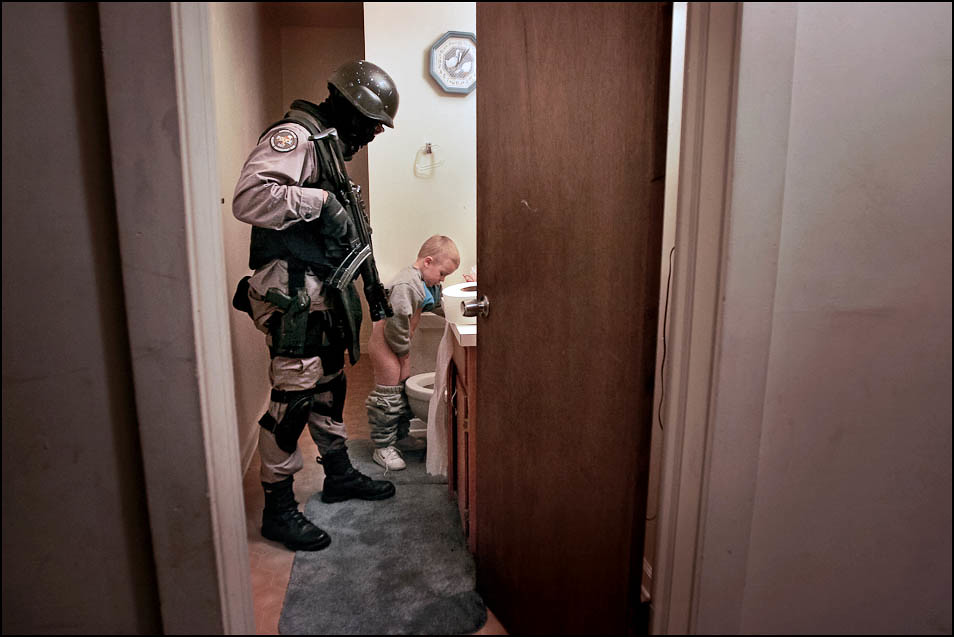
TID:
Justin, thanks for being a part of this. I'm very excited to feature
this picture. It's remained, in my mind, one of my favorite and
surprising images that I've seen over the years.
JUSTIN:
Thanks Ross, it is an absolute honor to be featured on this
blog in the company of so many talented photographers. I
read each new entry and always come away feeling more
educated.
This image is what I consider the peak moment of a drug
raid in Durham, North Carolina, an image I made during my
senior year at the University of North Carolina - Chapel Hill.
In summation, undercover officers purchased drugs from this
home on multiple occasions as part of a sting operation. After
obtaining a search warrant, they raided the house with the help
of a SWAT team. I was only 22 years-old at the time I made this
photo and really inexperienced, so it was a rather intense
experience leading up to moment of the image.
TID:
Since this image is part of a larger body of work, please talk
about the what the story is, and where it fits within it.
JUSTIN:
The larger story I was working on was about the Durham Police
Department's Gang Enforcement Units, or Gang Units for short.
Gang-related shootings and homicides were spiking in Durham,
and there was a lot of national attention to gang issues and I
wanted to do a story that somehow captured that. When I
discovered this unit I was fascinated by what they were doing
at the street level. I essentially broke the story down into simple
themes and wanted to capture them in very defined moments.
This photo fit into one of the themes on my list: "an intimate and
unexpected moment." I hunted for such a photo for months with
no luck, and then it just happened one day, very quickly, when
I least expected it.
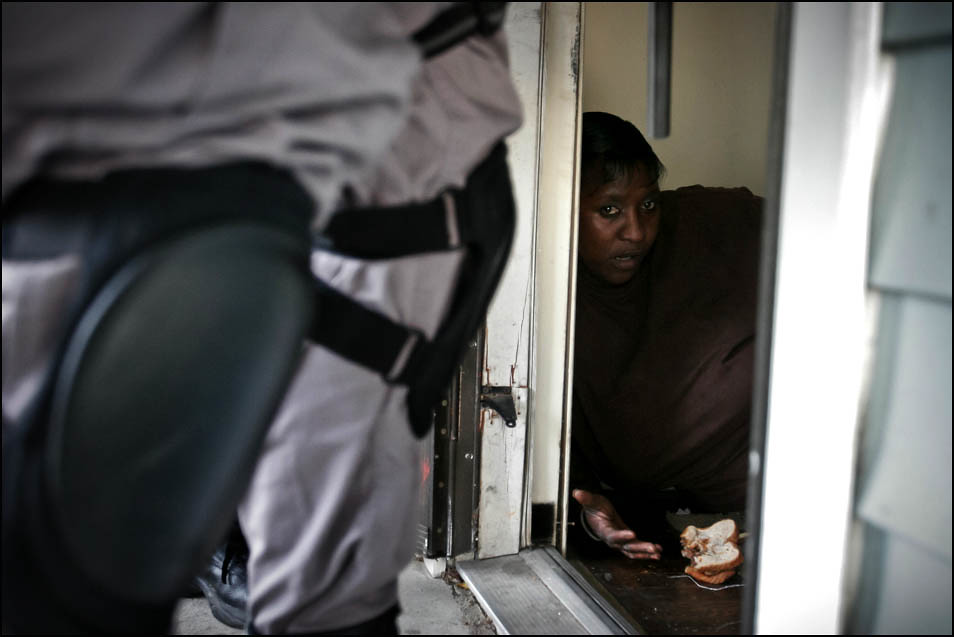
TID:
It's remarkable to me that you did this at such a young age. How did
you manage to gain access to this story?
JUSTIN:
It’s actually very random. Pat Davison, my professor at UNC,
told me that someone from PR at the police department called
him and wanted to know if any of his students wanted to come
ride along with an officer. The department needed some generic
photos of officers doing their jobs for an annual report. The
department figured it would be a good way to give students a
chance to see the police in action.
I went out one afternoon with an officer, and it was really uneventful.
At the beginning of the summer I got an email from the PR officer
again, and she wanted to know if I would be interested in coming
out one night when the department was doing “city-wide operations.”
She said it would be a chance for me to see some “really gritty
stuff.” I couldn’t turn that down.
What happened next changed me forever.
I rode along all night with the Durham Police Special Operations
Division while they executed search warrants with a SWAT team.
To say it was intense was an understatement for someone as
green as I was. Back at the station I sat down next to a woman
dressed in a t-shirt, combat boots and tactical pants. She started
talking to me, and asked me how my time went. I told her it was
the craziest night of my life and that I’d love to do it again. We
chit-chatted a lot and I told her about the in-depth projects I was
doing for my photojournalism major at UNC. Then she introduced
herself.
Turns out I had been talking to the Major of Uniform Patrol and
she was third to the Chief of Police in command. She said if I ever
wanted to come ride along with the Gang Units to let her know, and
she gave me her card. I asked her “How about tomorrow night?”
She obliged. The next night she “embedded” me with Gang Unit 2
and my time with them was crazier than the night before. I emailed
her when I got home at 2 am, slightly stunned, sent her links to my
work from school and asked her if she would be open to me doing
a project about the Gang Unit. She arranged it so I could go ride
with them any time I wanted to. I had an all access pass. I was in
but things hadn’t gotten crazy yet. The real trick was getting along
with my subjects.
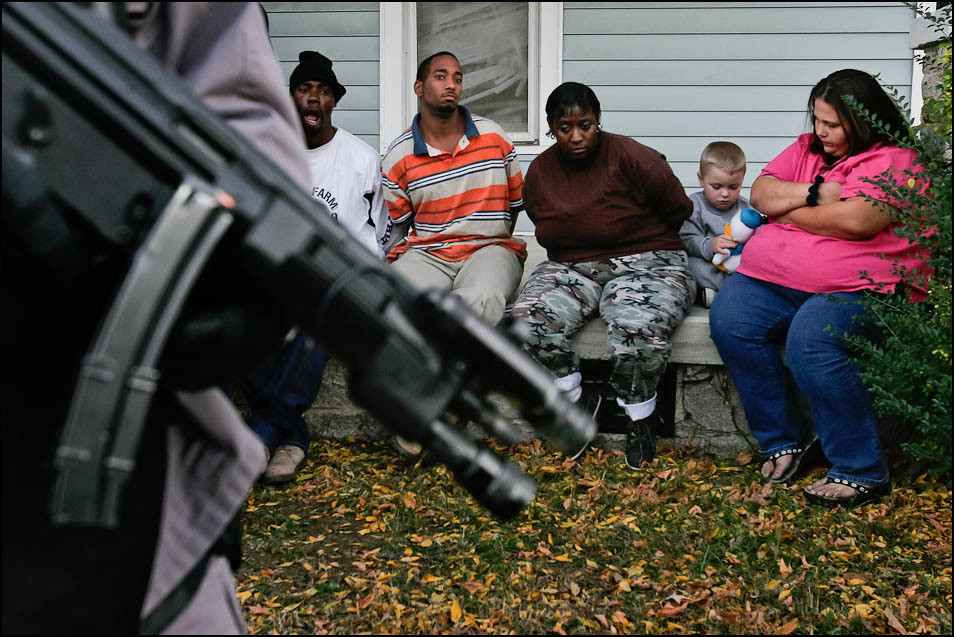
TID:
I'm assuming there was some complications. What were they, and how
did you overcome them?
JUSTIN:
I think many of the officers were skeptical of me at first, and that
was a huge hurdle. I think it is only natural for the police or anyone
that functions as a unit or team to be suspicious of outsiders. I also
felt like a third wheel at first since the major was insisting on me
riding along. They ran their mouths to me a lot and talked shit to
each other all the time. They always joked that if they did anything
wrong that I would “run and tell the Major,” like I was some whiney
kid sent to spy on their unit. It was how they bonded and how they
tested me, to see if I could hang.
I tried to earn my keep, and I began to talk junk back to them, and
I think they respected me. But I came back basically every night that
summer and many times each week during the school year. Soon it
was like I was part of the team. We developed an interesting rapport.
They were cocky, hilarious and they were good at what they did.
Their tactics were wild and unorthodox compared to the popular image
of a police officer. I have to say I liked them immediately.
When they weren't making fun of me or telling me my photos
sucked (they were always "dark and blurry") they were looking out
for me on the street. They even tried to goad me into joining them
when they worked out together as a team. Eventually they opened
up to me and told me all sorts of things, from bitching about the
politics of the police department to showing me photos of their kids
and how tall they had grown in the past month. Their jobs were not
glamorous, rather they were grueling, and they witnessed a lot of
hard things day in and day out. They still got the job done on their
terms, though. I admired them for their ability to do that, and I realized
I could never do what they do. Some days it was like the movie
“Super Troopers” and other days it was white knuckle until their shifts
ended. They really seemed to trust me, and I’ll never really know why.
Maybe they just wanted to be heard. They even gave me a nickname,
"Clickit," after the noise my camera made.
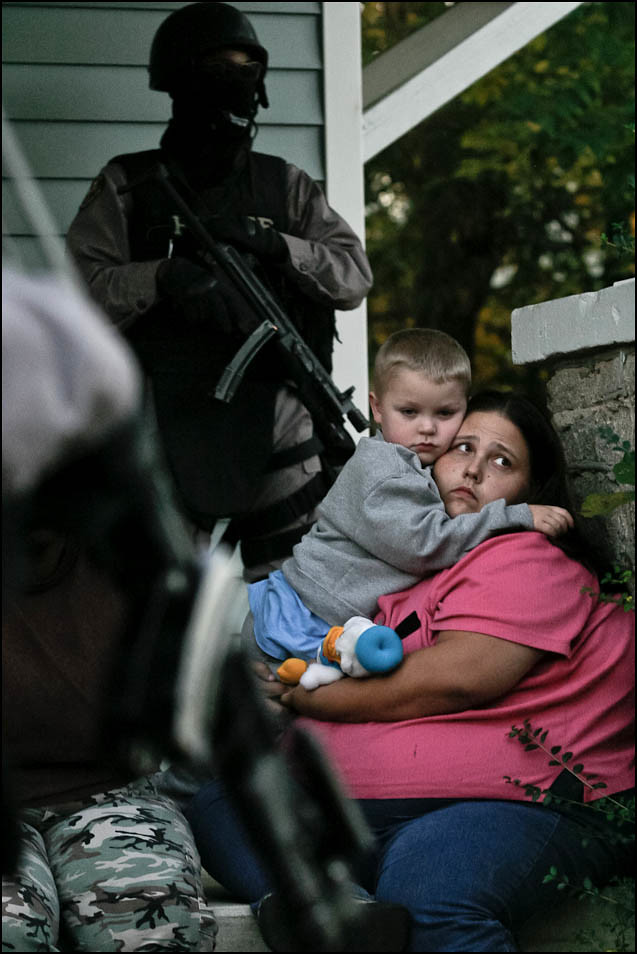
The gang units worked with the SWAT teams on more dangerous
assignments such as the raids on houses, vehicle take-downs, and
standoffs with armed suspects, because even with their best intelligence,
they never knew what to expect. Some of the on-call SWAT officers
worked as gang officers during the day and they began to take
notice of me. A lot of them were ex-military, and they were much
quieter than the regular gang officers. They seemed curious about
me, and I began to build rapport with them. They wanted me to take
photos of them and soon enough I was riding in their raid van on the
way to the houses, in a stack of urban soldiers who were dressed
in full combat gear. It was one hell of a summer, and it was humbling
to have the access I had.
A big challenge was trying to stay out of the officers’ way. Often I
was up front and center in moments of great chaos. Some of the
raids were really intense and my senses needed to be sharp.
Sensory overload was common - the noises of stun grenades
exploding, doors being shot open, the sounds of frightened
children and occupants was a commonplace. What I experienced
couldn't compare to actual combat (which I have never seen), but it
felt like the Wild West.
The officers could be squirrely about me shooting photos on private
property, but often I would talk to the residents and explain what I
was doing, and they wouldn’t mind me being there. In a sense, I
think some of them wanted me there because they felt if the police
abused their authority, I’d have it on camera. I think on the same
coin the police felt that I’d have the events on camera in the case
that a suspect made a false claim against them. Eventually it
wasn't an issue and I’d began to move very freely in the houses.
Sometimes suspects just thought I was a cop. I carried a model
release with me just in case.
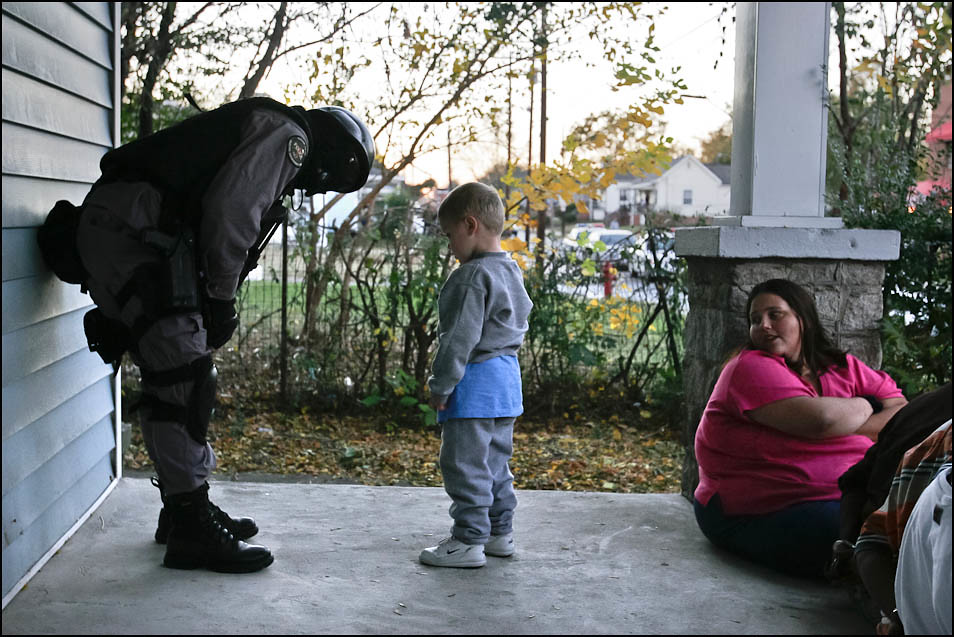
Another complication was my own emotions. What I saw in
Durham was a sick game: a cycle of poverty and crime that was
really frustrating. It was a microcosm of a national trend. There
were so many things contributing to that game, things so much
bigger than myself, and I felt small and adrift. I frequently
glimpsed people’s inhumanity, their desperation and the
damage done by community apathy. I felt powerless and an
immense sadness which fueled some of my photos. I closed
myself off from my friends a lot and bottled my frustrations.
That’s why began to relate to many of the officers’ frustrations
with their jobs, and sometimes they could be very comforting.
An officer from the SWAT team who usually operated the
battering ram during raids gave me great advice once: he said
that he “focuses on the guy next to him and on knocking down
doors together,” and that I should too. That is pretty deep if
you think about it in the context of community.
I also saw some of the most sincere expressions of love
within some dire circumstances, and I realized that people are
people no matter how they live - whether they are cops or criminals.
Most importantly it made me realize how screwed up things
can be in our own country, and how important it was for me
to know my own community, including its underbelly. I realized
that I didn’t need to go to some war-torn country half-way around
the world to photograph poverty or violence. I asked myself,
“How can I help people in Africa if I can’t serve people in Durham?”
TID:
Now, onto the image. Tell us what lead up to the image and how you
handled gaining access to it, and what was going through your mind
at the time.
JUSTIN:
The Gang Unit was working with SWAT to serve a search warrant
after establishing probable cause that drugs were sold in the home.
Officers often never knew what to expect. There could be a huge
stash of drugs or guns there, or there could be a tiny bit of pot, it
all depended on the timing of the raid. If they showed up too late
everything could be sold, distributed to dealers or transferred to
some other place for storage. They hit the house hard and had to
ram the door open. The explosion of the stun grenade they used
was deafening. The first thing I saw was a woman laying on the floor
behind the door, a sandwich laying next to her. She was completely
startled.
The occupants were detained on the front porch as officers
searched the home. Officers rushed to the back of the house
to intercept some people trying to flee from the back door. The
last people out of the house were a mom and her young son.
She looked visibly shaken, but her kid seemed unfazed by the
chaos, and this grabbed my attention immediately. I began to
photograph the scene on the porch.
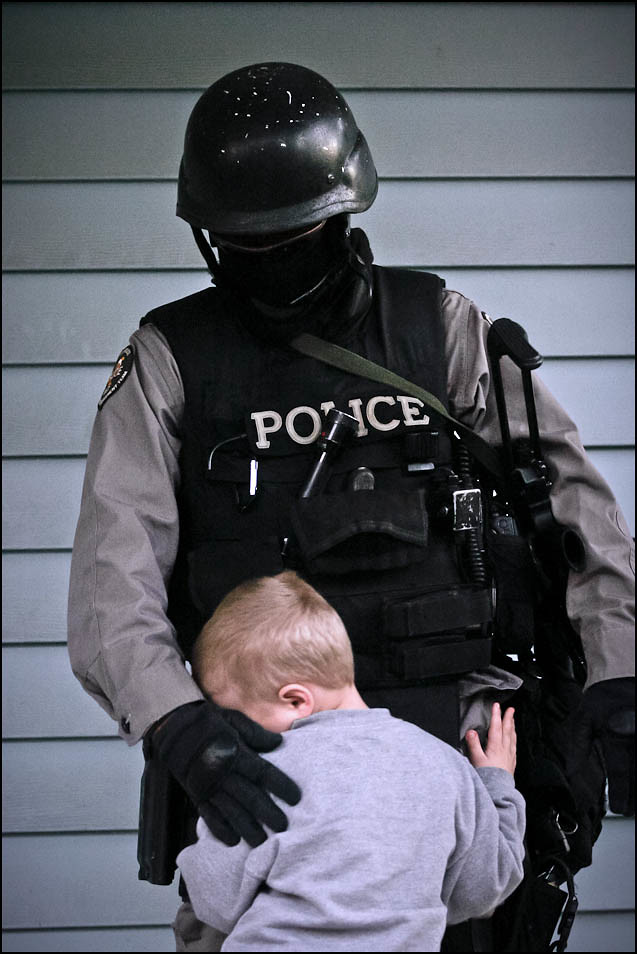
Most of the officers have kids and they hate seeing a child caught
up in a raid like this. Some guys from the SWAT team brought him
a stuffed animal to calm him, but he was calm and the mother
needed it more than he did. A SWAT officer whispered in my ear
that the kid had experienced a raid before and that was why he was
so calm. I was shocked. It was wild to think that this might be a
normal experience for this kid. I shifted all my attention to him.
During the search, SWAT maintained their formation around the
house and the kid began to high-five and hug one of the officers
on the porch. He started playing with his flashlight. The mood at
the scene really shifted and it was easy to forget I was at a drug
raid. Suddenly the child looked up at the officer and said “I gotta
potty,” and he was escorted into the bathroom. I rushed in front of
them to catch the scene. I fumbled with my camera settings and
focus and tried to melt into the background. I only made three frames
of the whole thing before the moment ended.
TID:
Was there any concern about you taking this picture at the time, and
if so, how did you handle it?
JUSTIN:
Their wasn’t much concern. It was in the heat of things, and the
officer and the child never even acknowledged me in that moment.
Honestly I barely remember taking this photo, but I will never
forget that day. I remember a Sergeant walked past me after I took
it, and he made some snide joking comment about how I was a
pedophile. I fired my own choice words back at him (joking of
course since that is how we related). And just like that we were
off to raid a house down the street. I didn’t even have time to talk
to the kid’s mom. I really want to meet her and see how she is doing today.
Concerns developed more after I made the image. A few days
later, I brought a print of it to the special operations commander
and he loved it. The general feeling amongst the officers was that
the moment captured the often complex nature of their job: one
that requires brute force and a soft heart. To me it was a slice of
humanity wedged between moments of chaos and some larger,
unfortunate circumstances. One of the officers who never really had
nice things to say to me (not out of spite, but mostly to toughen
me up) pulled me aside one day and told me “Clickit, I talk shit
to you a lot but I wanted you to know that your photo is great.
It’s like a 21st century Norman Rockwell painting.” I thanked him
and then he told me I was “still a piece of shit.” I think that is the
greatest compliment I will ever receive.
Everything got weird a few years later. An online blog got ahold
of the photo and decried it as a moment of police brutality, evidence
of the over-militarization of our police forces. People even said I was
a pedophile and not a journalist and it was really frustrating. It’s funny,
the first people to defend me were the officers I worked with, which
really blew my mind. I have never been so humbled in my life.
A few years ago when I was working for The Roanoke Times I got
a call from a US Marshal. He wanted to know if I was Justin Cook,
a photographer who went to UNC and used to live in Durham.
Confused as to why he was calling, I told him that was correct.
After reassuring me I wasn’t in trouble, he asked me about this
photo. A long story short: he was part of a federal court case
against a polygamist cult in Texas that was broken up and raided
by federal argents. The cult’s defense attorneys had stolen this
image from a website and entered it as evidence in their federal
trial. They claimed that the photo was made during the raid on
their compound, and was evidence of police brutality during the
“unjust” raid. The US Marshal needed my help in proving that they
had entered fake evidence in a federal trial, which was easy for me.
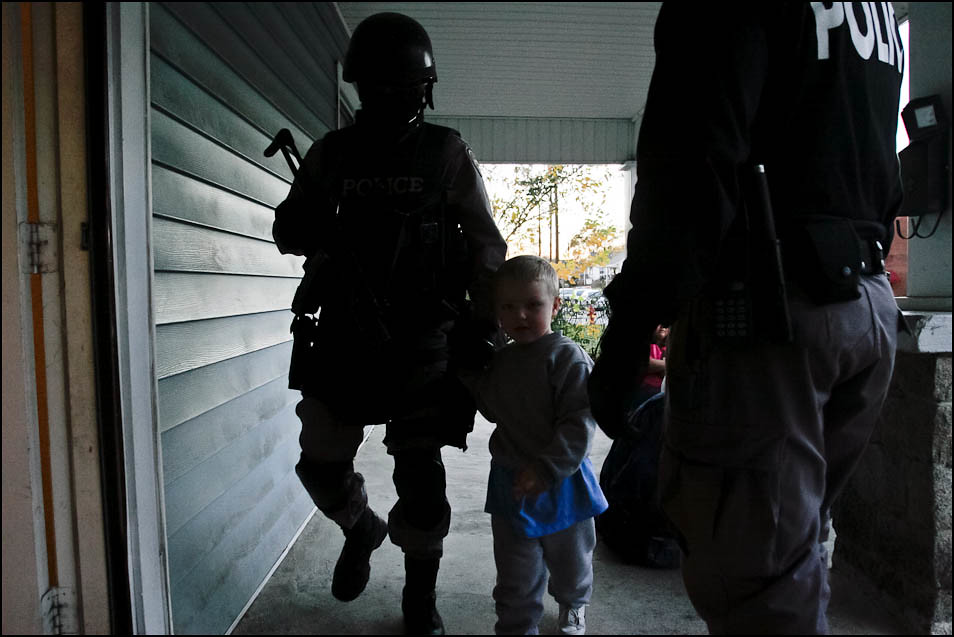
I was shocked but also laughing hysterically in disbelief. It was
surreal. After he proved to me that he was a real agent, I faxed
him documents to prove that the image was mine and even sent
him raw photos, including some before and after the moment. He
thanked me profusely and told me my help was crucial. The now
defunct Court TV even called me about the image too for a story
they were doing about the trial. It was really bewildering. I went to
bed satisfied knowing a single photo shot in 2005 might help
discredit the defense of a potentially dangerous cult halfway
across the country four years later.
Regardless of what people thought of the photo or of me, I am
glad it made people pause and that it sparked varied reaction
and debate. I guess that is the point of a photo, to start a dialogue.
I felt like I had done my job, for that moment at least. The image is
kind of ambiguous but I hope I have cleared up the misconceptions
about it.
TID:
I think many people think you have to be a very seasoned photographer
before you start pushing deep into social issues, but you dove right in
from the beginning. I encourage people to look through your website to
see more examples of your intimacy. That being said, it took me years to
feel comfortable in situations you seem to feel comfortable in right away.
What goes through your mind, do you think, to make this possible.
How do you think you're mental process is different than others?
JUSTIN:
I don’t think I will ever really feel comfortable in situations like this,
but I know that I often thrive in chaos. I really like the challenge of
making people feel comfortable and working your way in with your
camera. I was mischievous as a child, and sometimes I get that same
feeling when I have my camera in a situation where cameras are often
not allowed. It feels like I am eating brownie batter out of the bowl
when my mom isn’t looking. Coupled with that emotion, I often feel
sadness and empathy for the subjects I am photographing. Burning
between those two emotions is a special place I go to where the real
“sculpting” or “making” of a photograph takes place. I try to spend
more time listening to subjects, and when they are done talking I try
to share with them something I have experienced in order to relate to
their situation. If I can’t really talk to them, I try to make eye contact
with subjects and let my body and face speak. Non-verbal cues go a
long way.
Sometimes it is hard to lift the camera, sometimes it feels like acting
when you have to swallow your fear, but it doesn’t have to feel like acting
if you are really concerned for people. My good friend and wonderful
photographer Jared Soares said it is often like a dance between compositions,
emotion and interaction. Some photographers I admire are Joseph Rodriguez
and Eugene Richards, and though I will never reach their level I tried to
study their interviews and approaches. From them I have learned to balance
being unassuming/invisible with being present (be it your proximity or
emotional presence). I had some good coaches along the way during my
short time doing this: Melissa Lyttle, Steve Jessmore, Pat Davison to name
a few.
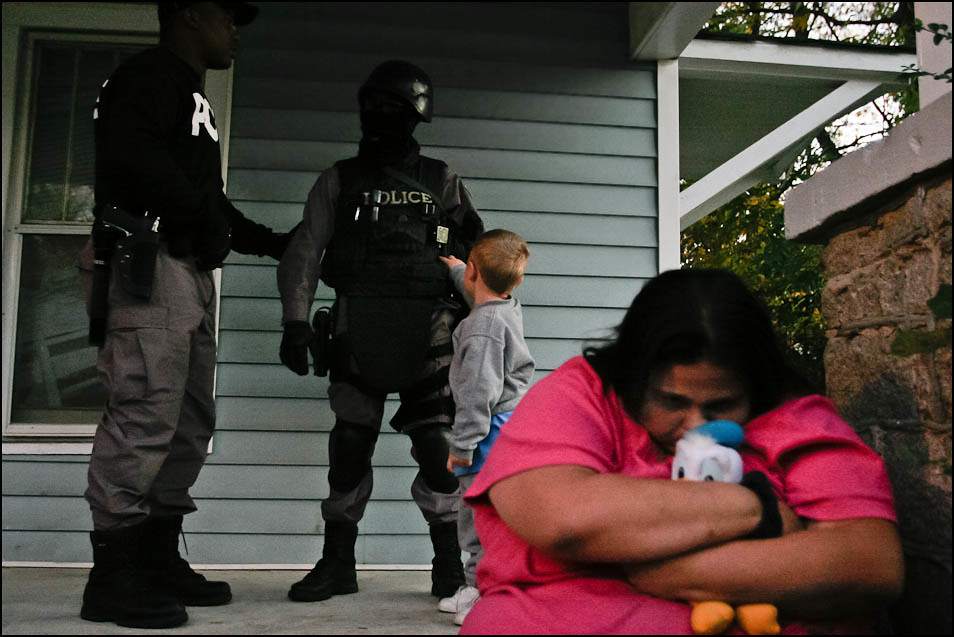
TID:
In conclusion, what advice (think mentally) do you have for photographers
to gain access to these type of situations?
JUSTIN:
The most important lesson I learned was to accept the blurring
of the lines of journalism. I had to unlearn some of the holy
tenants that I was taught in class about drawing lines between
you and your subjects. To maintain the access I had, I needed
to relate to the officers. They wanted to know that I was human.
I couldn't do that by being a quiet, uptight bump-on-a-log. I had
to be involved but I couldn't be too much of a pain in the butt.
When they told me to do something, I did it; when they wanted
me to help them I helped, and all the while I tried to have a
sense of humor.
I simply had to be there as much as I could. There is no
substitute for having your boots on the ground. Sometimes
an officer would call to tell me that their operation that was
planned for 6pm was now at 4pm. It would be 3pm and I
would be in math class at UNC. I would just quickly pack
up and rush to Durham without explaining to my teacher.
Why the hell would she believe me anyway? It is good to
have your heart broken too. The tough things I saw in
Durham broke my heart over and over. I met really amazing
people and connected with people suffering in the wake of
gun violence. I was suddenly thrust into the middle of
everything and in the process I learned a truth: Get close
to your subjects.
I think people have a fear of being unknown. I like to think
that people are inherently relational. Finding ways to relate
to anyone and everyone is key to getting access. If people
can relate to you they are one step closer to liking you. By
nature, people want to be around those they like. I got close
to my subjects and I think it served me well in my future
projects.
My advice is to just be real, be yourself and be dedicated.
My subjects were all those things and I tried to be that to them
in return. It also never hurts to have a little fun.

+++++++
Justin Cook is an independent documentary photographer who lives in Durham, NC with his two cats. He previously worked as a staff photographer at the New River Valley Bureau of The Roanoke Times in Christiansburg, Va from 2007-2010. His work has been entered in the Pulitzer Prize twice, awarded by College Photographer of the Year, Pictures of the Year International, Virginia Press Association, Society of Professional Journalists and other organizations. Although Cook’s photojournalism is award-winning, he gauges his success not in trophies but in the relationships he establishes with his subjects. Cook likes to get close with his lens but even closer with his heart.
Cook’s passion is telling stories about the South and capturing rural and inner city issues. He believes in the power of community and the importance of documentary photography in revealing the tapestry of ordinary peoples’ lives. He has seen that where there is struggle there is triumph, and in the direst of circumstance the most sincere expressions of love. With a little luck he believes the camera can sometimes promote social change.
A 2006 graduate of The University of North Carolina at Chapel Hill, Cook interned at The Dallas Morning News in Texas, The St. Petersburg Times in Tampa, Florida and the Flint Journal in Michigan. He has photographed stories from the wilds of the Scottish Highlands to the sanctity of a 1000-year-old Spanish monastery, the freezing cold of Michigan to the heat of the southwest, the chaos of inner cities to the solitude of rural Appalachia. He has been blessed by many friendships he has formed along the way with people from all walks of life.
Cook enjoys shooting weddings and is accepting freelance assignments anywhere as long as they don’t conflict with televised UNC basketball games.
You can view his work at:
http://www.justincookphoto.com/
+++++++
Next week on TID, we'll take a look behind this image from Lisa
Krantz's impressive body of work on Sam Houston High School:
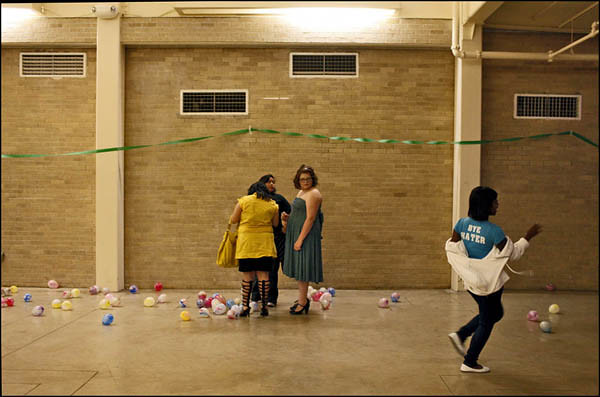
As always, if you have a suggestion of someone, or an image you
want to know more about, contact Ross Taylor at: [email protected].
For FAQ about the blog see here: